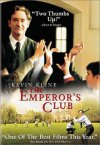BUY THE DVD:
|


|
|
|
SYNOPSIS:
| |
about a passionate and principled Classics professor who finds his tightly-controlled world shaken and inexorably altered when a new student walks into his classroom.
|
|
|
MOVIE FACT:
| |
based on a short story called, "the palace thief."
|
|
|
RATING:
|


two out of four possible stars
|
|
|
|
If a movie could succeed on the performance of one actor alone, The Emperor's Club would certainly fit that bill. Kevin Kline does his level best in his role as an overly serious prep-school teacher to convince his audience that his character is capable of a range of emotions that should bring the audience closer to its collective student. And though the sappy exterior of the story sometimes overwhelms the very simple (and verbally stated) theme of the film, even non-fans of Kevin Kline can appreciate what he brings to the screen.
It's a pity that a full-length movie can bring so little insight to the viewer into the many lives of the characters in this film, and it's probable that this stems from the fact that this film originated as a short story. While it is entirely possible to create a film full of insight into its characters, Emperor's somehow misses that boat. It certainly becomes moving in areas, especially in its closing minutes, but after one hundred and nine minutes, one cannot help but feel the journey taken is not as in-depth as it should be. There is some inspiration missing in this film and it probably comes from a lack of finesse in the script.
The creation of a simple story with a singular theme can make an interesting film, but this movie just doesn't say enough in its time allotted. Is it too much to ask that a film filled with the quips and phrases of Greek and Roman scholars include some intelligence created in the here and now? The research done to add relevant scholarly text to the script seems to have overtaken the real human-interest of the story. So much more could have been done with the emotional arcs of the characters. While none of the actors who play Kevin Kline's students are easily recognizable faces to begin with (at the time of this film's theatrical release), still none of the characters they play are vibrant enough to create a lasting impression.
Emile Hirsch, who plays the "bad apple" in Kline's classroom, has little impressive dialogue and his performance isn't as moving as it should be. And that applies to most of the characters. Itís as if every actor took his or her cue from Kevin Kline's very proper and reserved character when this movie was filmed. But whereas Kline looks emotional even when his character is incredibly buttoned-up, the rest of the cast suffers from too little emotional freedom.
It is hard to ascertain whether this problem stems from the actors themselves or the script, but it is more likely that this failing could have been fixed (or at the very least, alleviated) with additional character development from the supporting cast. The film, above all, is a story detailing the life of Kevin Kline's character, but the people around him aren't always clear enough. Embeth Davidtz, for example, plays Kline's love interest, but the relationship between their two characters is never explored sufficiently. Davidtz and Kline actually have some chemistry with one another, and it would have benefited the film to see them on screen together more often.
As is the case with so many characters in this film. There are certainly no bad performances in this film, in fact each actor does his or her job well, but their faces just fade into the background of beautiful scenery and a powerful score when the movie is finished. And though the cinematography and the music in this film are nothing if not moving, they are no substitute for living, breathing characters. But a further note on the look and sound of the film, James Newton Howard's actual score was used in the trailer, which isn't always the case as studios usually love to use the standard five or six "inspirational tracks" stolen from just a few films to create the preview from the film.
But Howard's score is one of the most intense aspects of the movie and although it was obviously created to pull at the audience's heart-strings during the appropriate moments, it still does the job admirably. Itís just too bad that the performances don't match the drama of the score. Kevin Kline may be at his "usual" best (when is he not?), but there is a conspicuous lack of raw emotion in this film, and that is rather large fault, considering this film is a drama and was created with inspiration in mind. Fans of Kline will be very pleased with his performance, and moviegoers will probably be entertained by this drama, but viewers really shouldn't look too deep into the film to find an inspired meaning to it all, because there isn't one.
Review by Kelsey Wyatt.
| |
|